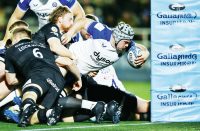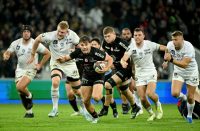
Which means, that if England head coach Stuart Lancaster is serious about going on the offensive this season, the swashbuckling Burns is a perfect fit for the Red Rose fly-half shirt.
If Lancaster needed any reminding of why he gave the Gloucester free spirit wings to fly as the starting No.10 in the two-Test series victory in Argentina over the summer, it came in the epic encounter between the Cherry-and-Whites and Northampton at Kingsholm last weekend.
Much has been made of the individual magic weaved by James Simpson-Daniel to make Elliott Stooke’s try, and likewise George North‘s mesmerising run for Jamie Elliott’s touchdown. Rightly so. However, in terms of perfect backline cohesion, flair and precision, it was the try carved out for Charlie Sharples by a silky-smooth Burns loop on Billy Twelvetrees that took first prize.
It helped Gloucester to their first win of the season after a grim start, and was a thing of beauty despite the officiating carbuncle that saw them to a 26-24 verdict over the Saints.
Burns says that, aside from the controversial last-gasp Twelvetrees penalty, what got them over the line was desire: “We had a bit of bite about us. We came out fighting and got our backs in motion – and when Billy (Twelvetrees), Henry Trinder, Sinbad (James Simpson-Daniel), Sharps (Charlie Sharples) and Rob Cook are in that sort of form they are hard to hold.”
So, with Gloucester contemplating the long haul up to Newcastle today, is their backline as special as some suggest?
“It can be. The Sharples try showed what we can do as a unit — and we’re all English, too. Newcastle has been a difficult trip in the past, and we have not done too well up there, but if we want to realise our ambitions we have to win on the road.”
Burns admits that to be a team for all seasons, capable of beady pragmatism as well as cut-and-thrust adventure, Gloucester require a fly-half controller with the same split personality. Suggest that he is a showman at heart, and not enough of a cold, calculating executioner, and he rejects the type-casting.
“People ask, ‘are you a crowd-pleaser’? No – but often I prefer it when there’s less time to think so that I’m forced to play from instinct. If I can make a break or score a try, I’ll go for it. The same applies when I chip ahead. I’m not doing it to look good, I’m doing it to try to win it for the team, and I’ll take whatever the best option is – and if that’s passing for a two-on-one, then it’s got to go.”
He adds: “My philosophy is to go out and win a game well, not play to avoid losing. Before you go on the pitch you do so much analysis on plays from your own five-metre line onwards that you are well prepared. However, you are not always going to get the perfect picture, and it’s then that you have to go into autopilot and play off instinct.”
The 23-year-old says that fly-half is the only position in which your judgement is so continuously and publicly on trial. He knows that the scrutiny by Lancaster, and by Premiership rivals, will focus on whether he has the control and the consistency to pull the fly-half strings for the full 80 – an area in which he lacked maturity a couple of seasons ago.
Here is Burns’ assessment of the challenge: “You touch the ball 80 times a game at fly-half, and to be the best you have to get it right most of the time. It’s about adapting, doing what it takes to win, and knowing when and where to do it. There are so many variables, and so many decisions to be made, but that’s what you get paid for. The reason Dan Carter and Jonny Wilkinson are so remarkable is because they make the right decision for the team nine times out of ten.”
Burns also admits to having a soft spot for Carlos Spencer, below, the All Black conjuror who was his mentor when he first joined Gloucester – and he suggests that whisking the best of Wilkinson and Spencer together would be an unbeatable blend.
He says that Nigel Davies, the Gloucester director of rugby, puts no limits on him, other than being expected to manage the game. “I have the freedom to play what I see, and sometimes you have to sit back and kick for the corners. I’ve made a big improvement in game management, and I know it can get better still.”
Burns explains why he prizes good, fast ball so much. “It’s about getting over the gain-line quickly. Ideally, I’m looking up to see what’s in front of me, and who is late into position. Then, if I’m flat on the gain-line and attack, defenders have no reaction time.”
The big drawback is that while Burns may have a superb backline and an outstanding backrow to link with, other parts of the Gloucester side are not as well-equipped to optimise on his gifts.
Despite having the acceleration to stay with the speedsters – “Sharps (Sharples), Jonny May and Sinbad are quicker over the long sprints, but I stick with them over 20-30m” – poor quality ball from the pack is an issue.
Although Burns defends the Gloucester front five strongly, before the Saints game a craggy former Kingsholm favourite told me that the current quintet is the worst he can recall. As a result, Burns does not get as many opportunities to use his searing acceleration as he might – especially from set-piece.
However, he has applied himself to other methods of keeping the scoreboard turning, and last season went from being one of the most patchy kickers in the Premiership, with a 60 per cent average, to the most successful as winner of the Golden Boot with a 75 per cent success rate. He says that the next challenge is to take it up to 85 per cent.
“If you’re kicking well it builds your confidence, and generally it means that your game is going well. If you miss you just try to park it and move on, but it is hard to compartmentalise. At Gloucester I’m lucky because Billy Twelvetrees and Rob Cook can step up and take the pressure off if I’m not having a good day – but I don’t give up the kicking duties easily.”
However, although Burns says that winning the Golden Boot last season was a massive plus, consistency is elusive, “For instance, I went for a kick at goal from distance against Northampton rather than kick for the corner. I backed myself, but it missed. Sometimes you take a risk and it doesn’t come off – but that’s the player I am.”
He reveals, too that, although he works hard, he’s not obsessive.
“I spend an hour and a half practising with Jon Callard every week, and also do a good 15 to 20 minutes kicking after every training session. But if I get six from six and strike it well I might pick the tee up and say, ‘I’m done’. Sometimes I get 20 balls and kick some of them without concentrating at all on technique. Then, gradually, I’ll build it in. However, if you’re kicking poorly you have to put the time in. It’s a mind game.”
Mental strength and self-belief flow through the Burns story, not least when you look at his move from Bath, his home town, to their West Country arch-rivals.
“I was 17 and in the Academy at Bath, but they were being a bit hesitant and Gloucester came in for me. I thought it was right to get out of my comfort zone at my home town club, and I haven’t looked back. I’ve been at Kingsholm for five years, played my 100th game for Gloucester recently, and I love the club.”
The same resolve was there when he made his England debut last autumn, coming off the bench for the last 15 minutes of the 38-21 victory over New Zealand.
Burns plays down his two successful penalties, but not the significance of the win.
“The boys had done a great job before I got on, and we had a 20-point buffer, so it gave me the chance to enjoy it. I took my first kick from in front of the posts with the crowd singing ‘Swing Low’, so I wasn’t that nervous”.
“It was amazing to witness, and in some ways surreal to be part of it. It’s great to know that I’ve been in the side which has beaten New Zealand, and it gives a huge confidence boost as well as setting a standard to strive for. Some of the gloss was taken away by the disappointment of the Wales game, but you think, hang about, what did we do against the All Blacks? Let’s remember what we are capable of.”
That attitude sustained Burns through the setback of being ruled out of the Six Nations with a knee ligament injury, and then being too hasty about his Gloucester return.
“I probably came back too early and started forcing things despite Nigel telling me to take it step-by-step. It was hard because you had people writing about you after the high against New Zealand. The next minute, you’re on your own in a gym doing rehab, and thinking that you’ve been forgotten.”
That fear proved unfounded and, having been selected by Lancaster to tour Argentina, he maintained his winning ways against the Pumas. Suggest to him that three England appearances and three wins is hard to beat, and he quips, “I may have to retire now!”
Burns does not consider it to be a given that he will get the No.10 shirt back this autumn, with rivals such as Owen Farrell and Toby Flood in the mix. Yet, he is clear about the advances he has made.
“The Tests in Argentina were a massive confidence booster. Even though both teams were understrength I was happy with the way we took the opportunity, went out to attack, and made our case.”
Now Burns, that rare breed of No.10 who has the speed of a finisher and the vision of a creator, craves the bigger stage of the autumn internationals on which to strut his stuff and make his 2015 World Cup pitch.
























